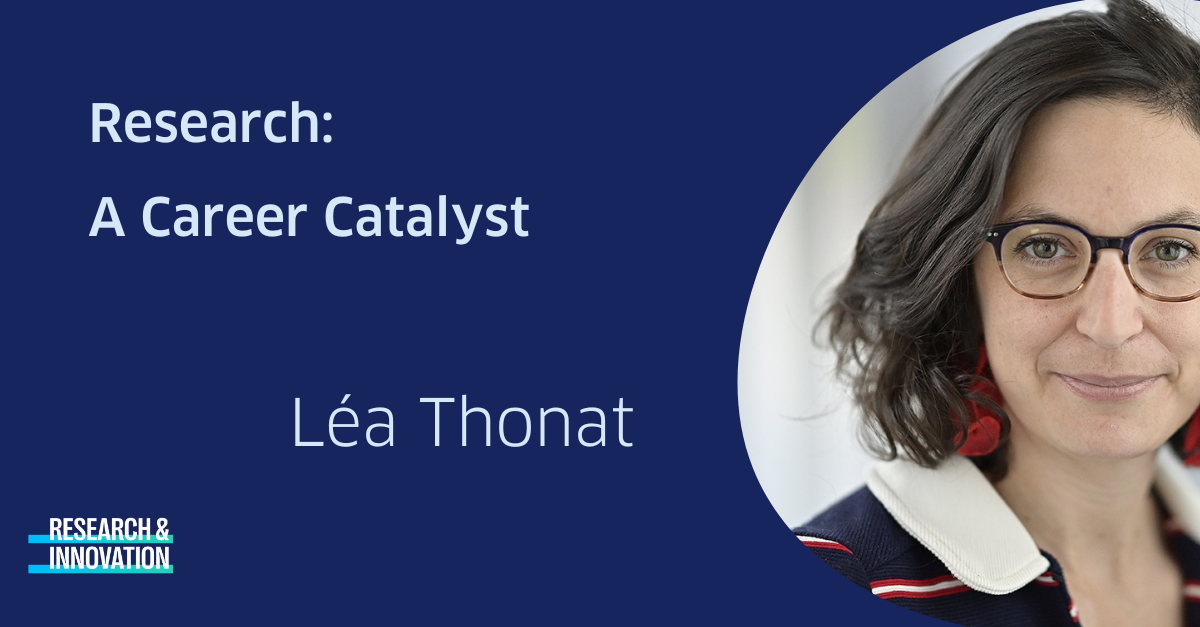

If I were to have a gift, I would choose the ability to popularise and convince, in particular on environmental and social issues. Léa Thonat
I originally studied sociology, and gradually moved into project management. I have a Master's 2 degree in social sciences survey engineering, and I wanted to broaden my skills in the project management component of that.
I started by focusing on the construction and public works sector, looking at how jobs in that sector are gradually transforming. That was in 2012, at the time of the “Grenelle Building Plan”, and questions were already being raised about the energy transition and the need to cut back on the energy consumption of France's buildings. Towards that end, it was clear that the professions involved would need to increasingly work together. And from construction to energy, there is but a short step -- one which I took ten years ago, when I fell head over heels in love with a job offer from Lab Crigen.
The fact that it involved working in collaboration with other experts. I saw that multidisciplinary approach as essential. I had experienced it before, with economists and statisticians, and already, on the scale of a small research consultancy, found it to be a key dimension. I thought to myself, “Gosh, there will be all the more areas of expertise and opportunities for collaboration in this work!” Plus, I like a challenge and I thought I absolutely had to try to change things from the inside, rather than criticising from the sidelines.
I think it’s important for sociologists to be part of the company -- the same goes for R&D. My profile is not particularly academic; I didn’t do a thesis, for instance. On the other hand, I was determined to apply the tools of the social sciences to a company environment and make them work to the benefit of my colleagues. At Lab Crigen, everyone around me came from an academic background, and we complemented each other very well.
I fell in love with it too. It’s a subject I felt drawn towards already in secondary school. I really enjoy observing and understanding. I get the impression that when you understand the “interplay” between everyone involved, it's much easier to take position and build things. And that's a skill I wanted to gain.
My initial aim wasn't necessarily to work at a company. Lots of sociologists choose to either head into academia, or turn towards institutions and associations. But it's an important skill, whatever the field you’re working in.
At Storengy1, I'm in charge of relations with the regions for our 14 storage sites in France. The aim is to guarantee a high level of professionalism and safety at our facilities, recognised by our stakeholders (the administration, local authorities and local residents), to be identified by our stakeholders as a responsible and useful player at the local level, and to develop actions and partnerships that are consistent with the needs of the sites and regions in which they are located.
Yes, we work both on existing sites and on projects to find new salt caverns, in particular for our hydrogen storage activities. In the latter cases, we do have to go and see areas we are less familiar with. As a result, there is a whole process we need to go through to revive dialogue with the stakeholders.
The multiplicity of fields, colleagues and subjects I was able to deal with enabled me to take my skills to a new level and get to know the Group extremely well - as much its professions as its networks and its various businesses. Even though I wasn’t working only for Storengy before, I already know a lot of my colleagues there. The fact that I've been analysing the interplay between parties and controversies for ten years should help me a lot as I now go on to conduct and organise relationships.
Collaboration really speaks to me. The way I see it, you can't achieve anything on your own, even if you're extremely expert in a given field. At ENGIE, there are all these highly specialised experts with incredibly in-depth knowledge in their areas, but without collaboration, we wouldn’t be able to ensure that this high-quality work is brought to everyone across the Group. So maybe I would quote Isaac Newton, who said: “When two forces are joined, their effectiveness is doubled”.
That’s a good question! It's hard to choose, but if I had to pick just one I'd say the gift of popularisation and conviction, particularly on environmental and social issues. I'd like to have the ability to break complex social, climate-related and environmental phenomena down into simple terms, and be able to convince people to engage in this direction, or at least to think about these issues. The idea is not to impose a vision, but at least to engage people towards that path.
I'd tell them it's an environment in which you flourish. In the Group, and of course at R&I, women can definitely flourish. An action plan and objectives have been set up, and that is very important. It is now the responsibility of the managers, when recruiting, to present those objectives and action plans to the young people in training.
Secondly, to build loyalty in the women already in the Group and R&I, I feel that managers, both men and women, have a part to play by setting an example.
Storengy, a subsidiary of ENGIE, is one of the world leaders in underground storage of natural gas. Storengy is also a key player in renewable gases (biomethane, hydrogen, syngas).